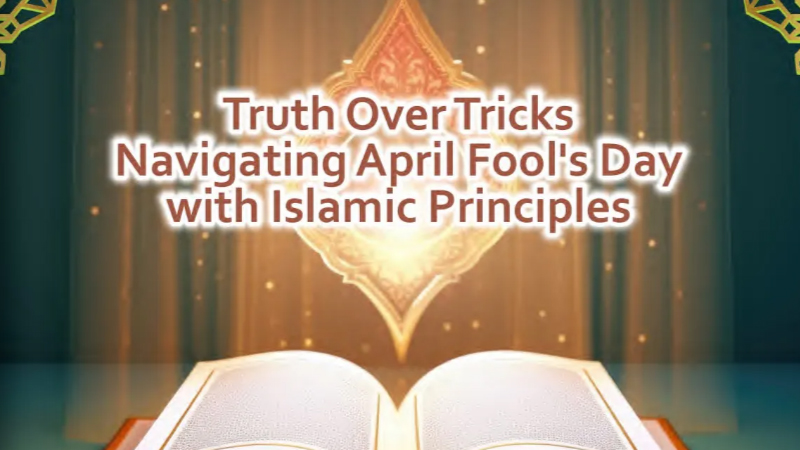April Fool's Day, observed on the first of April, is a day filled with jokes, pranks, and hoaxes, celebrated by many around the globe. It's a time when people play tricks on friends, family, and even strangers, all in good fun. However, when viewed through the lens of Islamic teachings, the day takes on a different hue. Islam places a great emphasis on honesty, integrity, and the well-being of individuals and the community at large. This article delves into the origins of April Fool's Day, the Islamic stance on lying and deception, the ethical implications of pranks, and how Muslims can navigate this day while adhering to their faith.
The Origins of April Fool’s Day
The origins of April Fool's Day are shrouded in mystery, with various theories suggesting ties to ancient festivals such as the Roman Hilaria or the Hindu Holi, both of which involve merriment and the relaxation of social norms. Some historians link April Fool's Day to the adoption of the Gregorian calendar and the confusion that ensued from moving New Year's celebrations from April to January. Despite these varied origins, the day has evolved into a widespread cultural phenomenon where deceit and trickery are celebrated.
Islamic Stance on Lying and Deception
Islam unequivocally condemns lying and deception. The Quran and Hadith, the sayings and actions of Prophet Muhammad (peace be upon him), provide clear guidance on the importance of truthfulness. For example, the Quran states, 'Indeed, Allah does not guide one who is a transgressor and a liar' (Quran 40:28). Similarly, Prophet Muhammad (peace be upon him) said, 'Leave what makes you doubt for what does not make you doubt. Verily, truthfulness is tranquility, and lying is doubt.' These teachings highlight the grave importance Islam places on honesty and the detrimental effects of deceit.
The Detriments of Deception
Islamic teachings not only promote truthfulness but also provide stark warnings about the consequences of lying and deception.
• Erosion of Trust: The Social Impact
Lying and deception erode the fundamental trust that holds social relationships and communities together. Islam emphasizes the sanctity of brotherhood and social cohesion, and deceit is seen as a direct threat to these bonds. When trust is compromised, the very fabric of society begins to unravel, leading to conflict and disharmony.
• Spiritual Deterioration: The Personal Consequence
From a spiritual perspective, engaging in deceit distances an individual from Allah (God) and the path to righteousness. Each act of deception is a step away from the divine promise of Paradise and a step toward spiritual decline. The Quran warns against following the footsteps of Satan, who is the epitome of deceit, further illustrating the gravity of lying in Islam.
April Fool's Day, characterized by its encouragement of pranks and hoaxes, presents a stark contrast to the Islamic virtue of truthfulness. Islam's unequivocal condemnation of deceit, regardless of intent or harmlessness, underscores the fundamental ethical clash between the tradition of April Fool's and the teachings of Islam.
• The Sanctity of Truth in Islam
Islam places immense importance on truthfulness, regarding it as one of the highest virtues and a foundation of a Muslim's character. The Quran
and Hadith are replete with admonitions against lying and deception. For instance, the Quran states, "O you who have believed, fear Allah and be with those who are true" (Quran 9:119). Such verses highlight the pivotal role of honesty in maintaining the moral and social fabric of a Muslim community.
• The Prophetic Example: A Beacon of Honesty
Prophet Muhammad (peace be upon him), revered for his impeccable character, was known as "Al-Amin" (The Trustworthy) long before his prophethood. His life exemplifies the significance of truthfulness, with numerous hadiths illustrating his disdain for falsehood and deceit. The Prophet's teachings and actions serve as a guiding light for Muslims, advocating for honesty and integrity in all dealings.
The Ripple Effects of April Fool's Pranks: Undermining Social Trust
April Fool's Day pranks, often designed to deceive or embarrass, can have unintended consequences that transcend momentary amusement. From causing emotional distress to eroding trust within communities, the ramifications of these pranks can be profound.
• Disruption of Community Harmony
Islam emphasizes the importance of community cohesion and brotherhood. Deceptive pranks, by their very nature, can sow seeds of mistrust and discord among individuals, undermining the Islamic principle of unity. The potential harm inflicted upon others, even if unintended, is viewed critically in Islam, which always prioritizes the welfare and harmony of the community.
Navigating the Ethical Landscape: Islamic Guidance on Honesty and Integrity
In light of the ethical challenges posed by April Fool's Day traditions, Muslims are encouraged to reflect on the Islamic values of honesty, integrity, and empathy. Islam advocates for interactions that foster trust, respect, and understanding, urging believers to consider the impact of their actions on others.
Fostering a Culture of Honesty
Muslims are called to lead by example, promoting a culture of honesty and transparency in their communities. By abstaining from practices that involve deceit, Muslims can embody the teachings of Islam, reinforcing the bonds of trust and brotherhood among people.
The Path to Ethical Awareness
The ethical considerations surrounding April Fool's Day offer an opportunity for Muslims to engage in introspection and dialogue about the importance of truthfulness and the implications of deceit. Through education and awareness, the Muslim community can navigate the complexities of modern traditions while staying true to their faith's core principles.
Potential Harms Associated with April Fool’s Day
While April Fool's Day is often seen as a time for fun and harmless pranks, it's important to remember that not all jokes land softly. Sometimes, what's meant to be a small trick can end up hurting someone's feelings, causing confusion, or even leading to misunderstandings that strain friendships. In more serious cases, pranks can go wrong, resulting in physical harm or situations where people feel unsafe. This can be especially troubling in communities where trust and respect are highly valued, like in Islam, which teaches kindness and honesty. Misleading someone, even in jest, goes against these teachings. Moreover, when jokes cause unnecessary worry or fear, it disrupts the harmony and peace Islam strives for. By being mindful of our actions and choosing not to partake in deceptive pranks, we can avoid causing harm and maintain a loving and respectful atmosphere that uplifts everyone.
Navigating April Fool’s Day as a Muslim
Navigating April Fool's Day as a Muslim comes with its unique set of challenges, given Islam's clear stance against deceit and falsehood. For Muslims, the day presents an opportunity to affirm their commitment to honesty and integrity, values deeply rooted in Islamic teachings. The practice of playing pranks, often associated with misleading others, stands in direct opposition to the principles of truthfulness and sincerity upheld by Islam. Muslims are therefore encouraged to approach April Fool's Day with caution, opting instead to engage in behaviors that reflect their faith's teachings on honesty and mutual respect. This could involve fostering positive interactions and spreading joy in ways that are genuine and sincere, avoiding any form of deception. By doing so, Muslims not only adhere to their religious convictions but also set a positive example for others, promoting a culture of trustworthiness and respect. In essence, April Fool's Day for Muslims is not about condemning the cultural practices of others, but rather about choosing a path that aligns with Islamic values, demonstrating that true joy and camaraderie can be achieved without compromising on the principles of truth and honesty.
Conclusion
Navigating April Fool's Day as a Muslim underscores a commitment to the core Islamic values of honesty, integrity, and respect, starkly contrasting with the deceit often celebrated on this day. Islam's unequivocal condemnation of lying and deceit, as explored in the document, showcases the significant spiritual and social ramifications that such actions can have, emphasizing the erosion of trust and community harmony. Muslims are thus encouraged to embody their faith's teachings by abstaining from pranks that mislead, instead fostering a culture of honesty and transparency. This approach not only aligns with Islamic principles but also contributes to a respectful and sincere engagement with cultural practices. The emphasis on truthfulness and integrity serves as a guiding principle, showing that joy and camaraderie can be achieved without compromising on the virtues of truth and kindness, ultimately fostering a more trusting and harmonious community.


